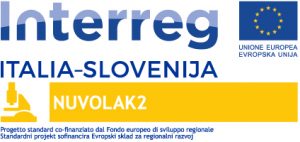

The festINNO event is organised by the Faculty of Management of the University of Primorska, together with other partners of the NUVOLAK2 project, which is co-financed in the framework of the Interreg V-A Italy-Slovenia Programme with funds from the European Regional Development Fund.
Just as Mark Zuckerberg wrote the code in 2004, creating the basis for what would later become the fastest growing company in the world, others can succeed as well – as long as they have the ideas and the proactive approach to make them come to life, said Aleš Pustovrh, Professor at the Ljubljana Faculty of Economics and the co-founder of Slovenia’s ABC Accelerator, at this year’s festINNO, held at the Faculty of Management in Koper, Slovenia.
It is important to know that ideas – if they are to lead to a profitable business – need to be communicated and tested, like in the case of the online picture platform “The Facebook”, which, quite unexpectedly and basically overnight, became hugely popular among Harvard students. This provided the foundation for the future social media platform which allowed its creators to become billionaires. However, an important part of their success was also the fact that they focused solely on the growth of the company, and not – at least not in this phase – on generating income.
They first implemented their solution in U.S. Ivy League universities, allowing the network/platform to grow in a controlled environment and, importantly, to expand due to the wishes of future users who wanted to become a part of the new network. The users then recommended the platform to their ‘network friends’, which the network creators did not have to pay for.
In mid-2004, an early Facebook team moved to the Silicon Valley where they were joined by manager Sean Parker, who had experience in promoting startup growth. It was Parker who turned the focus of this fresh team exclusively on company growth, and not on providing resources/generating income. He also secured their first angel investment of USD 0.5 million, which guaranteed the angel investor, Peter Thiel, a 10.2% share in the company.
“Smart money” is smart because such investors bring other experienced people and connections to the company, contributing to further startup growth. Peter Thiel therefore secured Facebook’s place in the Silicon Valley, which is still known as the centre of the startup industry.
However, investors also come with their own demands, and when Facebook failed to reach 1.5 million users by the end of 2004 (the first year of launch), instead reaching “only” 1.2 million, the said investor was not particularly pleased, but gave the team another chance, so in April 2005, Facebook received an investment of USD 12.7 million from the venture capital firm Accel Partners, whereas the company itself was valued at USD 98 million. The investor’s condition was that its representative, Jim Breyer, join Mark Zuckerberg and Peter Thiel in the company’s management.

PHOTO: Siniša Kanižaj / ABC Accelerator
The company ended the year with a negative result, so a year after the second investment, in April 2006, it received a new investment of USD 27.5 million from several venture funds, including Accel Partner and Peter Thiel, whereas the company was valued at USD 0.5 billion.
...and how the people behind it become millionaires
After extending the platform to high schools in September 2005 and opening it up to all web users a year after that, Microsoft bought a 1.6% share of the company in October 2007 for USD 240 million, putting its value at USD 15 billion. Despite this, the company still generated a loss, stressed Aleš Pustovrh. Why is that?
“Because it had great potential, while at the same time, it was surrounded by the best possible businessmen,” a member of the festINNO audience replied, whereas Pustovrh added that corporate investors, in this case Microsoft, are well aware of possible losses that come with such investments. “And can also afford them,” he added.
So if you are a company which is striving to achieve extremely rapid growth, you go to the Silicon Valley where you become part of the global ecosystem. In Facebook’s case, the positive cash flow started as late as September 2009, whereas until then, its growth was financed with investments from investors who were able to obtain shares of the company in return. This way, the company revenue could be brought from USD 52 million in 2006 to USD 4.27 billion in 2011, explained Aleš Pustovrh.
Mark Zuckerberg currently holds a 28% share, whereas Sean Parker holds 4% and Peter Thiel 3%, and all three are millionaires. They were able to achieve this partly because they were aware of their weaknesses from the very beginning, and were able to eliminate them by surrounding themselves with the right experts, and especially by being proactive. They also had excellent marketing and growth-related activities, while constantly facing competitors (Google+, the Chinese RenRen), which wanted to copy them. However, since they were the largest player in their industry – not forgetting that they were supported in this growth by a wide ecosystem – they were also the most attractive for users.
“And this is something other companies can achieve as well – by focusing on growth, you can surpass your competitors and become the largest player in your field,” said Pustovrh, asking the young participants: “How will you make sure that your idea comes to life?”
Project co-funded by the European Regional Development Fund